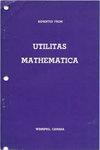关于 S C D F 模块
Q4 Mathematics
引用次数: 0
摘要
如果 σ[M] 中的每个 Dedekind 有限对象都是有限共生的,那么交换环上的模块 M 就被称为 SCDF 模块。利用这一概念,我们探讨了 SCDF 模块的几个性质,并描述了各种类型的 SCDF 模块。其中包括局部 SCDF 模块、有限生成的 $SCDF$ 模块以及 Rad(M)=0≠M 的空心 SCDF 模块。此外,我们还研究了双环背景下的 QF SCDF 模块。本文章由计算机程序翻译,如有差异,请以英文原文为准。
On S C D F -Modules
A module M over a commutative ring is termed an SCDF-module if every Dedekind finite object in σ[M] is finitely cogenerated. Utilizing this concept, we explore several properties and characterize various types of SCDF-modules. These include local SCDF-modules, finitely generated $SCDF$-modules, and hollow SCDF-modules with Rad(M)=0≠M. Additionally, we examine QF SCDF-odules in the context of duo-ring.
求助全文
通过发布文献求助,成功后即可免费获取论文全文。
去求助
来源期刊

Utilitas Mathematica
数学-统计学与概率论
CiteScore
0.50
自引率
0.00%
发文量
0
审稿时长
6 months
期刊介绍:
Utilitas Mathematica publishes papers in all areas of statistical designs and combinatorial mathematics, including graph theory, design theory, extremal combinatorics, enumeration, algebraic combinatorics, combinatorial optimization, Ramsey theory, automorphism groups, coding theory, finite geometries, chemical graph theory, etc., as well as the closely related area of number-theoretic polynomials for enumeration.
 求助内容:
求助内容: 应助结果提醒方式:
应助结果提醒方式:


